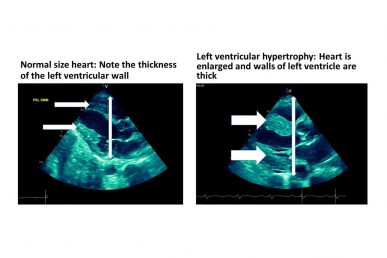Program will educate, empower ER visitors with uncontrolled high blood pressure
A new $3 million, five-year grant from the National Heart, Lung and Blood Institute will allow researchers to determine whether a unique program designed to educate people with uncontrolled hypertension — also known as high blood pressure — about the importance of getting their blood pressure under control can help reduce the risk of developing chronic and expensive-to-treat secondary cardiovascular conditions among this high-risk group.
“Even mild to moderately uncontrolled high blood pressure has consequences on the heart and sets the stage for future disease, including kidney failure, requiring lifelong dialysis, and heart failure,” said Dr. Heather Prendergast, professor of emergency medicine in the University of Illinois at Chicago College of Medicine and principal investigator on the grant.
Medical guidelines issued by the American Heart Association define hypertension as a blood pressure higher than 130 over 80 millimeters of mercury. High blood pressure can lead to thickening of the walls of the heart, which can reduce the heart’s ability to efficiently pump blood. Hypertension also increases the risk for kidney disease, heart disease, stroke and death. There are often no symptoms associated with high blood pressure, but if caught early enough, changes to the heart can be reversed and risks for secondary complications reduced. Lifestyle changes such as reducing sodium intake and exercising more, as well as medications, can help lower blood pressure.
“Uncontrolled hypertension is known as the ‘silent killer’ because it is often symptomless,” Prendergast said. “We know that about half of all individuals with uncontrolled hypertension do not even realize they have it.”
The study will enroll approximately 800 people who come into the University of Illinois Hospital emergency department and are identified as having uncontrolled high blood pressure — meaning they are either unaware of their elevated blood pressures and/or are not taking any steps or medication to lower their blood pressure.
Participants will be identified and randomized to one of two study groups after receiving evaluation and treatment for their initial emergency department complaint and prior to being discharged to home.
“Our goal is not to keep study participants in the emergency department any longer than they need to be there, so our evaluation, enrollment and the study interventions are streamlined and can be completed in about 20 minutes total, which is pretty short,” Prendergast said.
Half of the participants will receive the “usual care” for asymptomatic high blood pressure, which includes a pre-printed handout explaining high blood pressure and what can be done to help get it under control, and an outpatient referral for follow-up care with a primary care physician within 48 to 72 hours.
The other half of participants will view a three-minute video on high blood pressure including its causes and treatments. They will also be shown ultrasound images of age- and gender-matched hearts affected by hypertension.
“We want to show them what the difference is between a healthy heart and one that has these early changes attributed to uncontrolled hypertension, especially because many participants with high blood pressure feel totally normal, so seeing the ultrasounds is important in bringing the message home and empowering patients,” Prendergast said.
This group will also have a brief consultation with a clinical pharmacist or an advanced practice nurse to review all their current medications and receive additional educational information. For those individuals without a primary care physician, they will receive a scheduled follow-up clinic appointment.
All study participants will be re-screened three and six months later to determine whether their blood pressures have changed.
Earlier this year, Prendergast and colleagues completed a pilot study of the intervention program.
“A significant percentage of our emergency department patients are from minority populations, which we know have a higher incidence of uncontrolled hypertension,” she said. “By empowering participants through educating them about uncontrolled hypertension — especially if they are unaware that they have high blood pressure — and giving them the tools they need to address the issue by taking the time to show them exactly what the consequences are with the ultrasound images, and having them watch a short educational video, we found that people were much more likely to make changes to improve their blood pressures and overall health.”
Dr. Marina Del Rios, Renee Petzel Gimbar, Spyros Kitsiou, Ramon Durazo-Arvizu, Barry Carter and Dr. Martha Daviglus are co-investigators on the grant.

